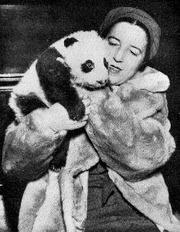 by Yoon Joung Lee Ruth Harkness is often remembered as the first person who brought the alive giant panda to the West. American fashion designer and socialite in New York in the 1930s, Ruth Elizabeth Harkness, was born in 1900 in Titusville, Pennsylvania. Her search of the Giant Panda in China started after her wealthy husband Bill Harkness died by throat cancer in Shanghai in 1936. Her husband was an adventurer who had traveled to China on his own panda-hunting mission. To follow in his footsteps, she decided to complete the mission herself and traveled to Shanghai. In China, she teamed up with a Chinese American explorer named Quentin Young and launched her own panda mission. Young’s main duty was handling logistics and managing the team members, including hunters, cooks, and coolies who carried their equipment. The team consisted of a total of 23 people traveling into deep wilderness and rough mountainous terrain, walking as many as 30 miles a day in temperatures as high as 100 degrees. In November 1936 when they set up a camp near the panda country, they finally encountered and captured a nine-week-old panda cub within a few days. They named the panda, Su Lin, after Young's sister-in-law who bottle-fed baby formula to the Panda on the trip back to Shanghai and the US. Bringing the alive panda from China to the US caused an international sensation over the world and made Ruth Harkness a celebrity of the period. When she returned back to the US, many eager reporters and media fought for delivering her story. The panda was deposited at the Brookfield Zoo in Chicago and brought thousands of visitors. However, the panda died after a year in captivity. Some assume that the changed temperature might have affected it, since panda bears prefer to live in cooler temperatures. Journalist Vicki Constantine Croke in 'The Lady and the Panda' describes that Ruth Harkness was a trailblazing figure whose story makes for an unforgettable, deeply moving adventure. Meanwhile, The Washington Post, introduced her uplifting quote about her interesting viewpoint to look at Westerners in China during her journey. "I felt that I did not need a foreigner; in fact I did not want another foreigner, for by that time I had seen enough of the attitude of most Westerners in China to heartily resent it. Why, because of the difference in the colour of a skin, people sweepingly think of themselves as superior beings, I could not understand, and still don't."
M. James McCombs
10/25/2011 09:28:55 am
I am Ruth's great nephew (Her brother Jim McCombs' grandson). Ruth had passed long before I was born, but all of us knew about her. This is the first time I had seen the above quote from my Great Aunt and could not agree more with her. This Country is even uglier today than they were then. By the way, My Great Aunt was not only NOT a Socialite, she was half American Indian ( we believe Mowhawk). Her father was an Irish Carpenter. Comments are closed.
|
Archives
July 2017
Categories
All
|
 RSS Feed
RSS Feed